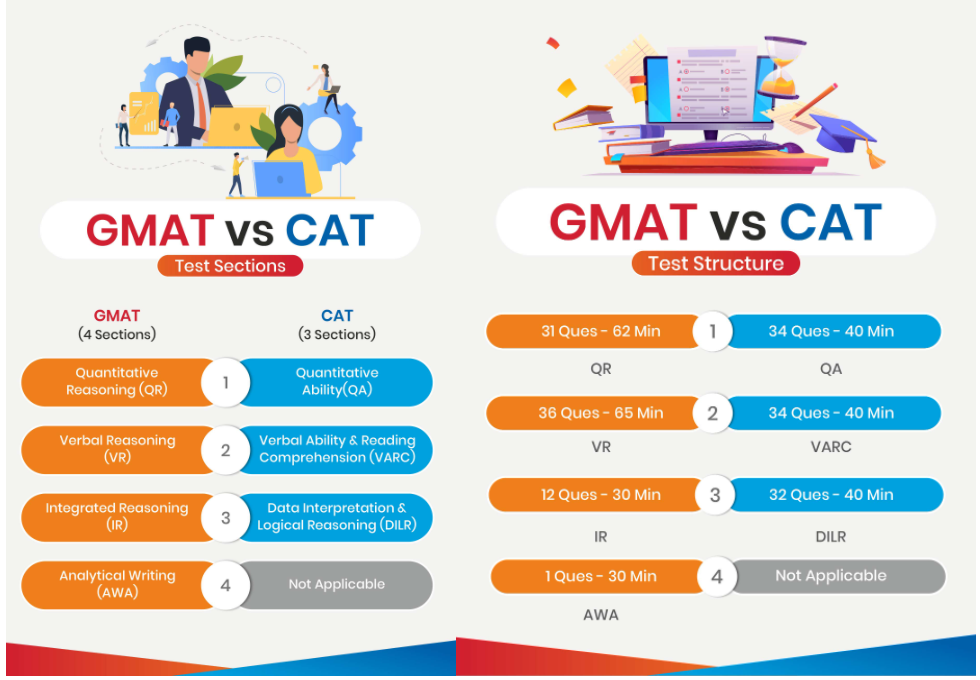So, you have chosen to be a leader of the daunting and profitable organisational world? Good decision! But to go forward on this trip, you have to keep that going. Master of Business Administration is one of the most lauded degrees internationally and so, you have to tread carefully with what kind of Business certification do you want to add to your name. This also led to the junction, where hopefuls do not know whether to choose – GMAT or CAT. If you are evaluating these choices in your head, you weren’t alone. The greatest thing is when you’re at the correct place. This article is a sincere effort by us to lead you in the appropriate path.
What’s CAT?
CAT stands for the Common Admission Test and is carried out by the IIM (Indian Institute of Management). The test is carried out once in a year and the result is effective for 1 year. CAT results are approved by over 1,200 B-Schools (almost all the B-school) in India, along with the prominent IIMs for their 2-year full-time flagship programmes.
What’s GMAT?
GMAT refers to the Graduate Management Admission Test and is administered by GMAC (Graduate Management Admission Council) located in Virginia, USA. The test is done 5 times in a year and the results stay valid for 5 years. GMAT ratings are approved by more than 7000 MBA programmes in 2500+ B-Schools across the world. In brief, it is a genuinely worldwide entrance test for management programmes for study abroad.
Test Structure
How to Choose?
When you have a good understanding of the nature and meaning of these examinations, you must bear the concerns regarding in mind until making your decision:
- Objective Career
- Option of Programme
- Study Destination and Return on Investment (RoI)
These problems not only influence your future but also have a significant effect on your professional skill growth over the key years of university.
Career Objectives:
The purpose of selecting an MBA could well be different from one applicant to another. One of the main determinants will be if you are a fresher, professional with 2-4 years of work experience or a professional with much more than 4 years of work experience.
If you’re newer, a full-time 2-year MBA program would better suit you. This will give you ample space to extend the horizons of your experience and to understand the integral principles of the central field of your preference.
If you are a specialist with 2-4 years of experience, your goal will be to advance progressively or seek management positions in the organisations where you operate. You may even be dreaming of a change of work or even a change of business at this point. An overseas university offering a blended 1+1 development programme that focuses on academia the first year and an apprentice in the next will be perfect for you.
At this stage of your career, you will mainly concentrate on executive services that give you the right balance of academic and technical ventures. This will be rigorous 1-year programmes that are extremely sector and will directly help you throughout your profession.
Option of the program:
Based on your career target, your curriculum option is expected to change. If you’ve picked a curriculum, you need to look for the closest B-School you can get. Remember, among other aspects, the university grades, curriculum scores, internships or scholarships offered, the chances to study under the guidance of professionals, and the system of instruction. Once you select a program that satisfies all of these guidelines, either GMAT or CAT online coaching will be carried out on the basis of the eligibility standards.
Study Destination and Return to Investment (RoI):
This is one of the primary factors behind GMAT or CAT. If you choose to study at IIMs in India, and if you’d like to enrol in the IIMs for a full-time 2-year MBA degree, then you need to take CAT. While there is a tremendous advantage when you go to GMAT since more than 140 B-Schools in India now recognize GMAT results. The list includes prestigious IIMs (for executive programs); XLRI, Jamshedpur; SPJIMR, Mumbai; IIFT, New Delhi; and IMT, Ghaziabad, among others. You can view the full list of Indian B-Schools that acknowledge GMAT scores on mba.com – the GMAC website. On top of that, if the World Rankings of Universities is one of the conditions for earning a degree, here is a general reference.
The overall cost of schooling and living in an overseas destination can be higher, but the return on the investment is considerably higher. If you equate the businesses that take part in the campuses of overseas universities with those that drive in Indian universities, you will find that there is a significant gap in the wages given to newcomers or even seasoned applicants.
If you are a professional with 4 or more years of experience and are looking for an Executive Program in one of the IIMs in India, GMAT or CAT could benefit you as well as you get several test attempts in the same year with a better chance of score improvement. This way, you’re not forced to apply for a holiday while there’s a significant job that you’re meant to be part of, and that will boost your professional profile. You need to figure in the RoI when you’re taking some time off to get ready for the exam and can miss out on earnings for a couple of months.




